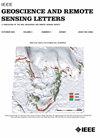Notice to the reader
IF 4
3区 地球科学
Q2 ENGINEERING, ELECTRICAL & ELECTRONIC
引用次数: 109
Abstract
—An adapted state-of-the-art method of processing information known as Reservoir Computing is used to show its utility on the open and time-consuming problem of heartbeat classifi-cation. The MIT-BIH arrhythmia database is used following the guidelines of the Association for the Advancement of Medical In-strumentation. Our approach requires a computationally inexpensive preprocessing of the electrocardiographic signal leading to a fast algorithm and approaching a real-time classification solution. Our multiclass classification results indicate an average specificity of 97.75% with an average accuracy of 98.43%. Sensitivity and positive predicted value show an average of 84.83% and 88.75%, respectively, what makes our approach significant for its use in a clinical context.读者须知
本文章由计算机程序翻译,如有差异,请以英文原文为准。
求助全文
约1分钟内获得全文
求助全文
来源期刊

IEEE Geoscience and Remote Sensing Letters
工程技术-地球化学与地球物理
CiteScore
7.60
自引率
12.50%
发文量
1113
审稿时长
3.4 months
期刊介绍:
IEEE Geoscience and Remote Sensing Letters (GRSL) is a monthly publication for short papers (maximum length 5 pages) addressing new ideas and formative concepts in remote sensing as well as important new and timely results and concepts. Papers should relate to the theory, concepts and techniques of science and engineering as applied to sensing the earth, oceans, atmosphere, and space, and the processing, interpretation, and dissemination of this information. The technical content of papers must be both new and significant. Experimental data must be complete and include sufficient description of experimental apparatus, methods, and relevant experimental conditions. GRSL encourages the incorporation of "extended objects" or "multimedia" such as animations to enhance the shorter papers.
 求助内容:
求助内容: 应助结果提醒方式:
应助结果提醒方式:


